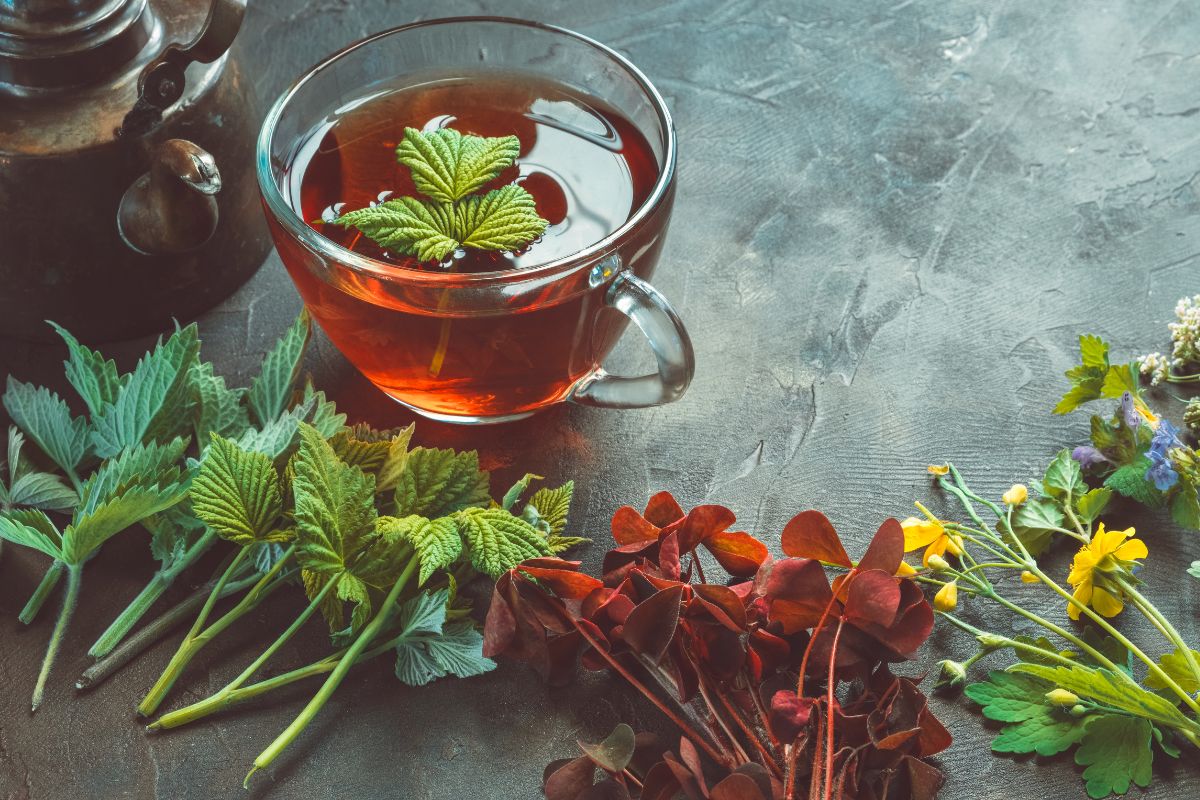Have you ever thought about setting up your own natural pharmacy right in a corner of your home? Yeah, I’m not talking about anything complicated. With just a few little plants in the backyard, on the balcony, or even in a small pot on your kitchen windowsill, you can take care of your health in a natural, practical, and even a bit magical way. 🌱✨
Today, I want to show you the top 5 medicinal plants you should always have at home. These are the everyday companions that help with everything — from a light stomach ache to that stress that insists on hitting at the end of the day. And the best part? They’re easy to grow, super versatile, and don’t require you to be any kind of gardening expert.
So get your heart ready (and maybe a notebook if you like jotting things down), because this content was made with care to inspire you to take your first step toward a life more connected with nature. Shall we?
1. Chamomile – The Queen of Calm 🌼
Chamomile is one of those plants that feels like a warm blanket on a cold night. With its tiny, daisy-like flowers and gentle aroma, it’s a classic when it comes to relaxation — and for good reason. Chamomile has been used for centuries in traditional medicine for its calming and anti-inflammatory properties. It’s widely known for reducing anxiety, promoting better sleep, easing digestive issues like bloating and cramps, and even soothing irritated skin. It’s so gentle that it’s often used for children and babies — like in teas to help with colic or fussiness. Plus, it contains antioxidants like apigenin, which binds to certain receptors in the brain and may help reduce insomnia naturally.
One of the best things about chamomile is how it encourages you to slow down. Brewing a cup of chamomile tea becomes a kind of quiet ritual — the warmth of the cup, the floral scent rising with the steam, the moment you stop and take that first sip… it’s grounding. Around here, it’s my go-to on those nights when my mind just won’t shut off. I keep a small jar of dried flowers handy, and honestly, that little routine of preparing tea before bed feels like an act of self-care. Chamomile reminds us that sometimes, all we need is to pause, breathe, and let nature take care of the rest.
2. Mint – Refreshing and Powerful 🍃
Mint is one of those plants you can recognize from far away, just by the smell. Refreshing, strong, and versatile, it goes way beyond mojitos and desserts. When it comes to health, this herb is practically a box of natural solutions. It helps digestion, fights nausea, relieves headaches, has expectorant action (great when your chest feels heavy), and even boosts your energy levels. And the best part? It grows easily, takes up little space, and doesn’t require much care. A true gift from nature!
What’s great about mint is that it can be used in so many ways: teas, juices, infusions, compresses — or even chewing on a fresh leaf after lunch to freshen your breath. I personally love keeping a little pot in the kitchen — it’s not only useful but makes the whole space smell amazing. And if you enjoy a relaxing moment, a warm mint infusion at the end of the day is a hug for your body and soul. It’s simple, accessible, and makes a big difference in your daily well-being. Plus, with it nearby, you always have a natural remedy within arm’s reach.
3. Lemon Balm – A Hug in Tea Form 🍵
Lemon balm, also known as Melissa, is that little plant that quietly arrives and calms everything down — your mind, your body, even your heart. Its soft aroma and delicate taste make it one of the most beloved herbs when it comes to relaxation. But it’s not just for stressed-out folks. It also helps relieve cramps, emotionally-triggered headaches, sleep disorders, and even mild digestive discomfort. All this without heaviness, without dependency, and with that natural touch we value so much. It’s like the plant is saying, “Take a deep breath — you’re okay.”
What’s amazing about lemon balm is how it turns into a true ritual of slowing down. Making tea, feeling the aroma rise from the cup, and sipping it slowly is, by itself, a mindfulness exercise. In my home, it became a tradition: whenever someone’s feeling overwhelmed or struggling to sleep, lemon balm comes to the rescue. And trust me — it works. Having a little pot around is like having a silent ally, always ready to offer comfort — almost like a grandma’s hug, the kind that calms you down just by being there.
4. Rosemary – Pure Energy 🌞
Rosemary is one of those plants with a bold personality. Just touching it fills the room with its strong, herbal, uplifting scent. But it’s not just the smell that’s impressive. This powerful herb has a long history of medicinal and spiritual use. For health, it helps improve memory and concentration, fights mental fatigue, and acts as both a natural anti-inflammatory and digestive aid. If you’re feeling foggy or mentally drained, rosemary tea can give you that push to reset your energy and clear your thoughts.
Beyond the physical benefits, rosemary is also known as a plant for protection and energy cleansing. Many people burn it for smudging, use it in baths, or simply place sprigs around the house to refresh the energy of the environment. And the best part? It’s super easy to grow, loves the sun, and does great in pots. At home, I always keep a rosemary plant near the living room window — and people often say the smell alone lifts the mood. Having rosemary nearby is like having a little ray of sunshine in your home, ready to energize your body, mind, and spirit.
5. Aloe Vera – The Multi-Tasking Plant 🌿💧
Aloe vera is the ultimate all-rounder of medicinal plants. With that cool, clear gel inside its leaves, it’s one of nature’s most versatile gifts. Its reputation in skincare and hair care is well deserved: it helps heal wounds, soothes burns, calms skin irritations, and deeply hydrates. Who hasn’t heard a grandma or aunt say, “Aloe fixes everything”? And honestly… most of the time, they were right. Around here, it’s essential during the summer — after a long day in the sun, nothing beats applying fresh aloe gel straight onto the skin to cool and restore it.
But aloe’s benefits go beyond external use. Some people consume the inner gel (the clear part, without the skin) in juices or smoothies for its digestive, anti-inflammatory, and even immune-boosting properties. However, this must be done with caution: the yellowish layer between the skin and the gel can be toxic and may cause side effects like diarrhea or stomach irritation. So, if you plan to ingest it, do your research or talk to an expert. The good news is that even just using it externally already brings a world of possibilities. Easy to grow and super resilient, aloe vera is like a living pharmacy in a plant — always ready to help when you need it most.
Why Have These Plants at Home?
Having medicinal plants you should always have at home is about more than saving money at the pharmacy or choosing natural remedies. It’s about self-reliance. Imagine being able to prepare a calming tea after a stressful day without even leaving your house. Or having a gentle, natural way to ease a sudden stomach ache. These little plants become everyday allies, always there to support you with simple, direct care — and fewer side effects.
On top of that, growing these herbs connects us to nature — even if you live in a tiny apartment in the city. Tending the leaves, watering, harvesting… it becomes a little ritual that helps slow your mind and bring you back to the present. It’s like these plants are green reminders that, even in the rush of modern life, there’s a gentler, more balanced way to live.
And there’s also an emotional layer you can’t ignore. So many of us have memories of grandma making boldo tea or mom applying aloe to sunburns. Bringing these herbs into your home is a way to reconnect with family traditions, emotional memories, and a lifestyle that’s more rooted and intentional. A simple little pot can turn into a bridge between generations — and honestly, that’s something no over-the-counter medicine can offer.
How to Get Started?
If you’re just now entering the world of medicinal plants, the golden tip is: keep it simple. Don’t try to grow a full garden from the get-go — that might end up frustrating you. Start with one or two easy herbs like mint or lemon balm, which are hardy and do well even in small pots. A sunny corner is all you need. It could be a kitchen window, your balcony, or even that forgotten little space in your laundry area. The important thing is to begin with what you have and slowly learn by observing your plant’s growth and rhythm.
Another valuable tip is to really connect with the process. Instead of seeing it as another chore, make plant care your personal moment of peace. Watering, trimming, harvesting… all of it can become a self-care ritual. You can even journal how you use each herb, how you feel after drinking the tea, or how the plant responded to your care. That exchange is truly transformative. Over time, you’ll see that growing medicinal plants isn’t just about physical health — it’s about mental and emotional well-being too.
Less Pills, More Nature 💚
Less medication, more nature. That’s a path more and more people are choosing — not because conventional medicine isn’t important, but because there’s a growing desire to return to the basics, to the natural, to what actually makes sense. Having medicinal plants you should always have at home is about reclaiming a softer, more conscious kind of care, where you learn to listen to your body before turning to industrial solutions. It’s about balance, not extremes.
Plus, when you start using these plants in your daily life, you begin to realize how small changes make a huge difference. An herbal tea in the evening can shift your whole mood. A warm bath with herbs can lift the weight of a hard day. And knowing that you grew that remedy yourself brings a deep sense of pride and connection — something far beyond physical wellness. It’s a way to reconnect with what really matters — and let’s be honest, that kind of connection is something we’re all craving in this fast-paced world.
So if something clicked while you were reading this, go for it. Even if it’s just one little pot to start with. Soon enough, you’ll see that these small plants don’t just bring health — they teach you patience, mindfulness, and gratitude. And when that once-simple herb garden becomes a sacred little corner in your home, a space for healing, care, and connection… well, that, my friend, is truly priceless.
Want to learn more about the benefits of medicinal plants? This YouTube video shares valuable info about several powerful herbs you can grow at home, including chamomile. It’s a great way to dive deeper and get even more inspired by the healing power of nature. 🌿✨

Sam Bright is a passionate researcher of the power of medicinal plants and their benefits for health and well-being. With years of study and practice in the use of therapeutic herbs, he is dedicated to sharing accessible, evidence-based knowledge on how nature can support health holistically.
Through his blog, Sam explores everything from the traditional uses of plants to modern scientific discoveries, always with a practical and informative approach. His goal is to help people integrate herbal medicine into their daily lives in a safe and effective way.

